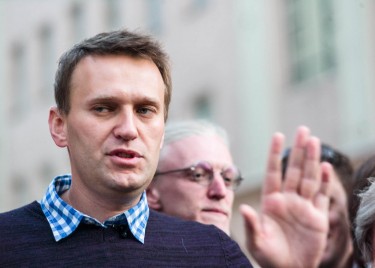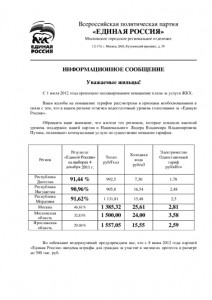This post is part of our special coverage Russia's Protest Movement.
According to documents published online [ru], police in Volgograd are investigating one of blogger Aleksei Navalny's newest crowdsourcing projects for possible ethnic extremism. In March earlier this year, Navalny formed the “Good Machine of Truth” [ru] (commonly abbreviated as “DMP” in Russian) as an intended counterweight to Russia's mainstream media.
Originally called [ru] the “Good Machine of Propaganda,” DMP's guiding star has been to discredit and lampoon Russia's two most powerful institutions: President Vladimir Putin and political party United Russia.
Past acts by the good machine of truth
DMP has distinguished itself by using unorthodox and often semi-legal outreach tactics. One of its earliest campaigns was to stamp Russian currency with the words “United Russia: A Party of Card Sharps and Thieves.” In a June 18 LiveJournal post, Navalny explained the stunt's logic: the quick circulation of cash means that a hundred stamped bills translate into an audience of 20 thousand people.
Just days later, Navalny announced DMP's next move: Operation “Krasnodar” [ru]. In a scheme that drove Gazeta.Ru blogger Sergey Smirnov to rename [ru] the group “the Stupid Machine of Spam,” DMP set out to send 100 thousand messages over the Russian social network Vkontakte to residents of the Krasnodar area. The plan was to transmit compromising information about Governor Aleksandr Tkachev and United Russia to everyone that lived in the Kuban. The message's template was over 400 words long [ru].
Smirnov compared the campaign to a previous initiative by Evgeny Korolev, who notoriously spammed thousands of LiveJournal blogs and forums in 2006, in an attempt to raise awareness about oppositionist activist Eduard Limonov. The backlash to that action was intense and Limonov eventually broke with his unfortunate promoter.
Additionally, DMP has tried to rally Russians against the Kremlin's limited cooperation with NATO in the war against the Taliban in Afghanistan. In a sensationalistic YouTube video [ru] and in flyers [ru] available online, DMP alleges that Putin conspired with the West to establish a NATO military base in Ulyanovsk in exchange for their acquiescence to Putin stealing the 2012 presidential election. The flyer concludes angrily:
НАТО теперь просто подкупает наивных туземцев, а этим туземцами стали мы.
The fake flyer from United Russia
The alleged police investigation in Volgograd concerns one of DMP's more recent campaigns. On July 4, Navalny introduced a new flyer [ru] that DMP activists were instructed to post in the entryways of apartment buildings across Russia. The document is an intentional replica of an official announcement from the United Russia branch any of the nation's 31 administrative areas that did not supply the party with more than 40% of their votes in the parliamentary elections last year. In other words, the flyer is meant for distribution wherever United Russia's support is already weak.
The fake United Russia posters contain real statistics about utilities and housing taxes, comparing low rates in Dagestan, Ingushetia, and Mordovia (where more than 90% of voters supported United Russia in December) to much higher rates in Moscow and any of the other 30 administrative areas where United Russia's votes were few. (The flyers are customizable [ru], and activists can even alter the text to feature language addressing the specific address of any building.)
The document also reads [ru]:
Обращаем ваше внимание, что жители тех регионов, которые показали высокий уровень поддержки нашей партии и Национального Лидера Владимира Владимировича Путина, оплачивают коммунальные услуги по существенно меньшим тарифам.
Putin: The national leader?
Initially, United Russia simply protested the obvious deception at play. Undeniably, DMP did disguise its propaganda to look like official announcements from United Russia. Navalny even encouraged [ru] volunteers to break into locked bulletin boards and place the flyers behind glass to make them appear more authentic.
Some United Russia figures accused Navalny of trying to distract [ru] the public from revived corruption charges recently levied by federal investigators. Others argued that DMP was violating campaign laws [ru] in advance of this October's regional elections.
The possible criminal charges in Volgograd, however, are different. Relying on an analysis [ru] from a local psychologist, prosecutors have apparently determined that the DMP flyer about housing and utilities is designed to incite ethnic hatred. The report, leaked online by Navalny himself, finds especially troubling the use of the term “National Leader” as applied to President Putin. Navalny responded incredulously, pointing out that it was United Russia officials themselves who coined [ru] the term.
While Navalny is correct that Putin has often been praised as a “National Leader,” he ignores the fact that DMP deliberately twisted the term's meaning to imply that Putin's “nationality” allegiances are specific, rather than universal. (Supporters call Putin a “National Leader” because his popularity is supposedly so high that he rises above partisan or ethnic loyalties.) If Putin is a “National Leader,” but selectively rewards the non-Russian southern republics, then “National” would seem not to include Russia's titular ethnicity, the DMP flyers imply.
Navalny's denotations and connotations
None of this is to say that Navalny or DMP are guilty of outright racism. However, Russia's number one blogger does not need to publish or promote overt racism to stoke the passions of nationalists.
When it comes to ethnic issues, Navalny is adept as denoting very little, but connoting a great deal. One of the ways to study this tactic and its effect is to find one of his blog posts that addresses some racially-charged news event. In mid-July, for instance, Navalny blogged [ru] about the public arrest [ru] of Chechen millionaire and suspected gangster Adam Taramov. On his LJ, Navalny linked to a news report [ru] from RenTV, where a large Chechen man, brandishing a shiny, nonstandard pistol on his belt, appeared at the scene of the arrest and claimed to be an FSB agent. Navalny notified his readers that he was submitting an official inquiry to the FSB to ask if the Chechen was indeed an agent of the service. (He wasn't.)
For Navalny, visibly appealing to the authorities was an opportunity to demonstrate a measure of vigilance in the face of Chechen lawlessness. To understand better what he was actually implying with such antics, one need only look at some of his readers’ comments to that same post.
While his LiveJournal is open to all, and any article is liable to attract stray radicals, there is often a pervasive, albeit subtle, racism present in the comments on Navalny's blog. For example, LJ user wimpall writes the following in a comment on the Taramov post, responding [ru] to another user who asked whether or not the FSB “agent” had any brains:
Зачем еще мозги – когда есть деньги. Нормальный чеченец.
Another commenter identified as Staer Lex recited [ru] a long list of justifications for the mass deportation of the Chechens and Ingush by the Soviet government in 1944. One blogger responded [ru] in disagreement. Another, shust50, thanked [ru] Lex for the “excellent proof” and complained that the media only credits Asians and North Caucasians with defeating the Nazis. The mainstream makes it seem as if Russians are only capable of “guzzling vodka,” he protests.
In a separate comment, user beloborodoff writes [ru]:
Этот человек имеет нужную национальность. Кавказец – друг Путина, зарэжет всех за него. Если бы был русский с пистолетомЮ то его сразу бы скрутили.
Most of Navalny's audience is not made up of raving bigots, of course. But he frequently does employ connotative language, when writing about ethnicity. Navalny's tendency to wink and quietly gesture at potentially inflammatory racial views may be precisely why Volgograd investigators — no doubt also motivated to defend Russia's ruling party — have decided to target DMP specifically for ethnic extremism.
This post is part of our special coverage Russia's Protest Movement.










1 comment
This is a barely relevant question, but has anything unsettling ever come to light about the goals or composition of Russia’s Antifa movement? I occasionally tweet about them in a neutral or mildly approving tone, and the only two consistent themes in the negative responses are homophobic slurs and accusations of anti-(ethnic) Russian bias. Their criminal charges of inciting hatred never specify who is being attacked, and Antifa’s own statements cited in the charges only mention “Fascists” by name. As far as their tactics, they do frequently brawl with right-wing thugs but, unlike the latter, never seem to initiate any such actions and certainly never target third parties like non-Slavs or foreign migrant laborers. And yes, I understand that Antifa is on the fringe of the fringe.
Asking the same question another way, is there anyone in the opposition worthy of accolades? Navalny has proven his bravery through his anti-corruption campaigns, so he can’t be pandering to the xenophobic Right solely out of fear. I’m trying desperately to avoid the conclusion that Putin is simply the least horrible of several horrible options.